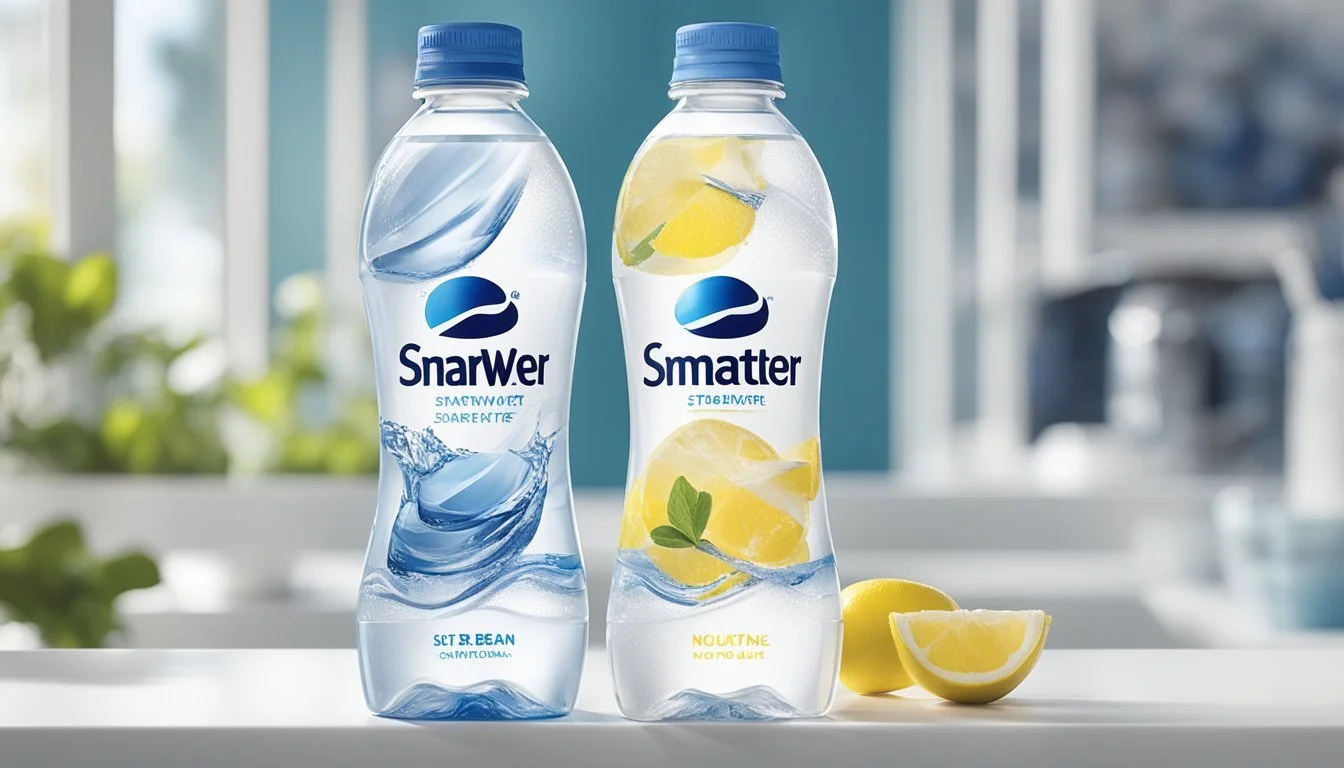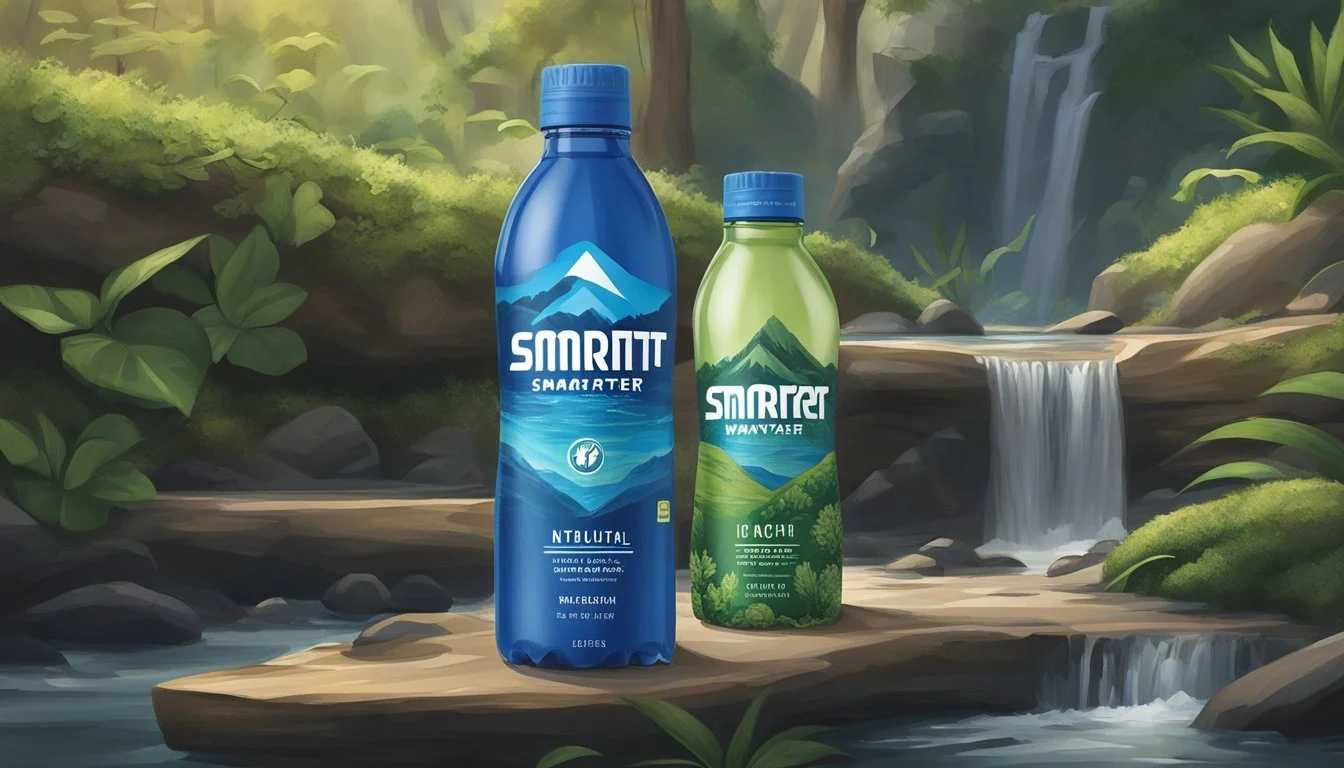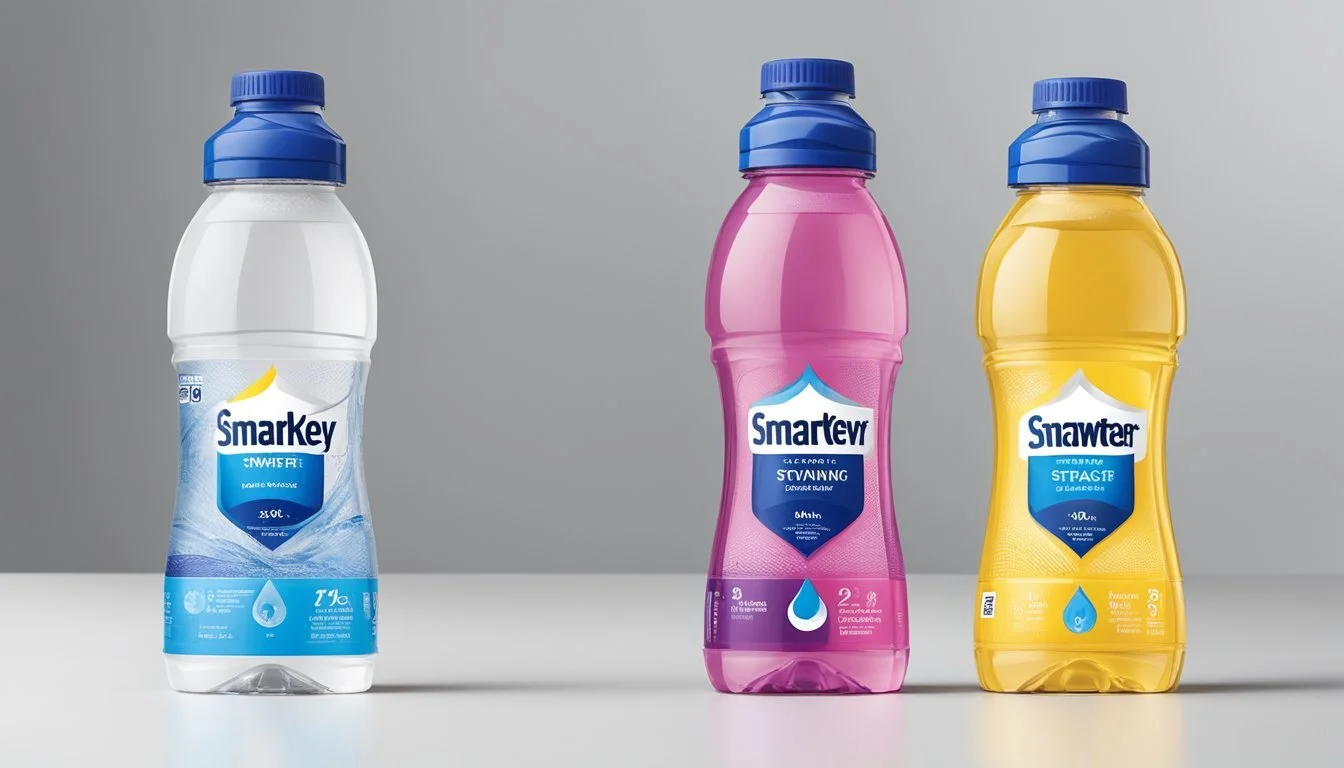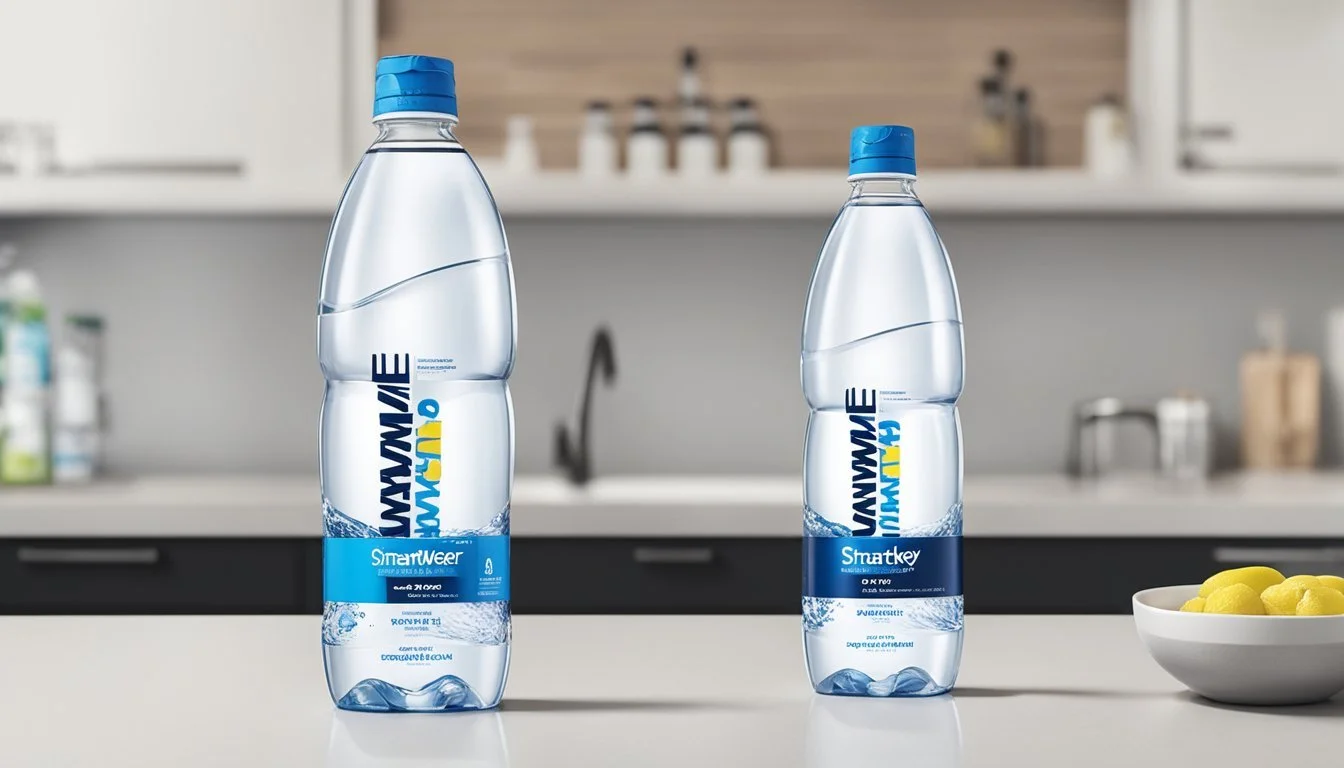Smartwater vs. Starkey
A Comparative Analysis of Premium Bottled Waters
When it comes to choosing between bottled water brands, Smartwater and Starkey are two prominent names that often come up in discussions. Both brands promise premium quality and unique health benefits, making the decision challenging for consumers. Smartwater, known for its added electrolytes, aims to offer enhanced hydration and a crisp, clean taste. This can be particularly appealing to those who prioritize hydration during physical activity or simply seek a refreshing, pure drinking experience.
Starkey, on the other hand, emphasizes its natural source and mineral content. Drawn from a geothermal spring, Starkey water boasts a distinct mineral profile that some advocates claim contributes to its unique taste and potential health benefits. This could be an attractive option for individuals keen on natural ingredients and the supposed benefits of consuming minerals directly from the source.
Comparing these two brands involves weighing the value of added electrolytes against the appeal of naturally occurring minerals. For those focused on enhanced hydration and a clean taste, Smartwater might be the better choice, whereas Starkey’s mineral content and natural sourcing could be more appealing to those leaning towards natural health benefits.
Understanding Bottled Water: Basics to Know
Different bottled water types, their quality, and comparisons with tap water are essential aspects that help consumers make informed choices. Each type has unique characteristics, and understanding these can significantly impact health and hydration.
Different Types of Bottled Water
Bottled water comes in various forms including spring water, distilled water, alkaline water, and vapor distilled water.
Spring water is sourced directly from natural springs and is often marketed for its natural mineral content.
Distilled water undergoes a process of evaporation and condensation to remove impurities and minerals, making it pure but potentially lacking in beneficial electrolytes.
Alkaline water has a higher pH level and may be enhanced with minerals such as calcium and magnesium, which some believe can neutralize acidity in the body.
Vapor distilled water is similar to distilled water but often has added electrolytes for taste and potential health benefits.
Evaluating Water Quality: pH and Mineral Content
Water quality is gauged by parameters like pH level and mineral content.
The pH level of water can vary, with alkaline water having a pH greater than 7. Regular and distilled water typically have a neutral pH of around 7. Some believe that alkaline water can offer health benefits such as improved hydration and acid-neutralizing effects.
Mineral content in water includes elements such as calcium, magnesium, and potassium. Spring water and some forms of filtered tap water contain natural minerals, making them potentially beneficial for health.
Electrolytes, often added to bottled waters like Smartwater, help maintain hydration and are crucial for bodily functions.
Tap vs. Bottled: A Comparative Overview
The debate between tap water and bottled water involves considerations of quality, convenience, and cost.
Tap water, subject to regulations and filtration, often contains chlorine and other treatments to ensure its safety but may also have trace contaminants.
Bottled water provides convenience and specific qualities like high pH or added electrolytes. Brands such as Smartwater are vapor distilled and enhanced with electrolytes.
Consumers often choose bottled water for perceived superior taste and purity, yet filtered tap water can offer comparable quality at a lower cost. It comes down to personal preference and specific health considerations.
Brand Profiles: Smartwater and Starkey
This section explores the origins, product lines, and unique features of Smartwater and Starkey bottled water brands, highlighting their key differences and similarities.
History and Manufacturers
Smartwater is a brand produced by The Coca-Cola Company. Launched in 1996, Smartwater quickly gained popularity due to its vapor-distillation process and added electrolytes. Coca-Cola markets Smartwater as a premium option among bottled water brands, emphasizing purity and clean taste.
Starkey, on the other hand, is owned by Whole Foods Market. Starkey Springs, discovered in 1896, provides the water. Whole Foods began bottling Starkey in 2016. Starkey water is sourced from a deep geothermal spring in Idaho, known for its high mineral content and distinctive taste.
Product Lines and Variations
Smartwater offers multiple variations to cater to different preferences. These include:
Original Vapor-Distilled Water: The flagship product.
Smartwater Alkaline: Higher pH level to suit those who prefer alkaline water.
Smartwater Antioxidant: Infused with selenium for added benefits.
Starkey's product line is more limited but distinct due to its unique source. Starkey focuses on:
Starkey 100% Spring Water: Bottled directly from the geothermal spring, rich in minerals.
Starkey Still Water: A non-carbonated version, maintaining its natural mineral balance.
Filtration and Distillation Processes
Smartwater's signature process involves vapor distillation. This method heats water into vapor and then condenses it back into liquid, removing impurities. Additionally, electrolytes like calcium, magnesium, and potassium are added for a clean taste and hydration.
Starkey water undergoes minimal processing to preserve its natural characteristics. It originates from a geothermal spring, naturally filtered through rock layers, resulting in high mineral content and a slightly alkaline pH. Starkey emphasizes its natural filtration as a key differentiator, contributing to its unique flavor profile.
Smartwater and Starkey offer distinct experiences to consumers. Smartwater focuses on modern processing techniques for purity, while Starkey leverages its unique natural source and minimal filtration. Understanding these differences can help consumers choose the best option based on their preferences for water quality and taste.
Comparing Health Benefits and Nutritional Value
When examining Smartwater and Starkey, it's crucial to note that both brands boast unique compositions of minerals and electrolytes. They also differ in pH levels, which can influence hydration and overall health benefits.
Essential Minerals and Electrolytes
Smartwater is known for its vapor-distilled process and the addition of essential minerals such as calcium, magnesium, and potassium. These minerals, in the form of calcium chloride, magnesium chloride, and potassium bicarbonate, contribute to the water's crisp taste and help maintain basic bodily functions.
Starkey, sourced from a geothermal spring, naturally contains higher levels of minerals. These include not only calcium and magnesium but also chloride and sodium. The natural mineral content in Starkey may offer enhanced hydration and potentially more comprehensive nutritional benefits.
Hydration and the Immune System
Smartwater’s added electrolytes are particularly beneficial for maintaining hydration during exercise or in hot climates. The inclusion of potassium and magnesium supports muscle function and recovery, while sodium helps balance fluids.
Starkey’s naturally occurring electrolytes could provide similar, if not stronger, hydration benefits due to its mineral-rich profile. For those with weaker immune systems or concerns about tap water contaminants, both bottled waters are safer options. Fluoride is not present in either, making them suitable for individuals seeking to avoid this additive.
The Role of pH in Health and Hydration
Smartwater usually features a neutral pH around 7, which is considered ideal for regular consumption without introducing acidity or excessive alkalinity.
Starkey, on the other hand, often boasts a higher pH, making it an alkaline water. Higher pH levels can be beneficial for reducing acidity in the body, which may improve digestion and enhance overall wellness. Alkaline water enthusiasts often believe it assists with better hydration and energy levels, although more research is needed to validate these claims.
Both Smartwater and Starkey provide unique benefits depending on individual health needs and preferences.
Environmental and Health Considerations
When choosing between Smartwater and Starkey, it's essential to consider the implications of their packaging and ingredient safety, as well as their sustainability and health benefits.
The Impact of Plastic Packaging
Plastic bottles are a major environmental concern due to their contribution to plastic waste.
Smartwater primarily uses plastic bottles, which can take hundreds of years to decompose. This leads to significant environmental impact, including pollution of oceans and harm to marine life.
Starkey also uses plastic packaging, though both companies claim to use BPA-free plastic. Even BPA-free plastics can leach other harmful chemicals, raising concerns about long-term health effects.
Contaminants and Chemical Additives
Contaminants and chemical additives in bottled water can affect health.
Smartwater undergoes a distillation process, which eliminates most impurities. However, the re-addition of electrolytes means consumers must consider what they're ingesting. Some studies suggest that these additives, although generally safe, could have long-term health effects.
Starkey water, sourced from geothermal springs, may contain natural minerals but can also have traces of contaminants. Testing for contaminants like heavy metals is critical to ensure its safety for consumption.
Sustainable and Safe Drinking Options
Sustainability in bottled water is becoming increasingly important.
Smartwater has made strides towards sustainability with initiatives to use recycled plastic in their bottles. This effort helps reduce the overall environmental footprint but doesn't entirely mitigate the issues of disposable plastic.
Starkey promotes the natural purity of its source but lacks significant initiatives for sustainable packaging. Consumers looking for eco-friendly options might consider alternatives like glass bottles or brands with strong sustainability commitments.
In choosing between Smartwater and Starkey, weighing these environmental and health factors can help make a more informed decision.
Taste and Aesthetics: Sensory Experience and Appeal
In comparing Smartwater and Starkey, both the flavor and tactile experience contribute significantly to their appeal. Each brand offers something unique, from the taste profile to the mouthfeel and aftertaste, catering to different consumer preferences.
Flavored vs. Natural: Comparing Water Offerings
Smartwater provides both natural and flavored versions. The natural version boasts a clean, crisp taste due to its vapor-distillation process. Its flavored options, such as Smartwater Cucumber Lime, are infused with natural flavors without added sugars or calories.
Starkey, on the other hand, is known for its natural spring water. It presents a distinct, pure taste with subtle earthy undertones due to its high mineral content. Starkey does not offer flavored varieties, emphasizing its commitment to natural, unaltered water.
Comparison:
Brand Natural Flavored Smartwater Yes Cucumber Lime, etc. Starkey Yes No
The Importance of Mouthfeel and Aftertaste
Mouthfeel is crucial in evaluating bottled water. Smartwater's mouthfeel is often described as smooth and light, owing to its careful distillation process and infusion with electrolytes for taste. This results in minimal aftertaste, appealing to those who prefer a clean finish.
Starkey offers a more robust mouthfeel owing to its natural mineral content. Consumers often note a richer, more substantial presence in the mouth. The aftertaste reflects its source, leaving a mild, earthy residue that some find pleasurable, while others might not.
Personal taste plays a significant role. Some prefer Smartwater for its smoothness, while others appreciate Starkey's distinctive mineral profile. The choice between the two often comes down to individual taste preferences.
Cost Analysis: Affordability and Value
Both Smartwater and Starkey aim to appeal to consumers who prioritize high-quality bottled water but at varying price points. This section will explore their respective costs, the factors contributing to their pricing, and provide insight on the value each brand delivers considering budget constraints.
Price Comparison Between Smartwater and Starkey
Smartwater is typically priced between $1.50 and $2.50 per 1-liter bottle. The cost is influenced by the brand's purification process, which includes vapor distillation and the addition of electrolytes for taste. Starkey, on the other hand, is often priced higher, ranging from $2.00 to $3.50 per 1-liter bottle. This higher price reflects its sourcing from geothermal springs and minimal processing to maintain natural minerals.
Consumers on a budget might find Smartwater to be the more affordable option. It's also widely available in bulk packages, further lowering the price per unit. Starkey's higher price may appeal to those who value the artisanal quality and unique sourcing of the water.
Understanding the Pricing of Premium Bottled Waters
Premium bottled waters like Smartwater and Starkey often have higher prices due to several factors. Smartwater's pricing includes costs associated with advanced purification techniques such as vapor distillation, and the addition of electrolytes, which enhances the water's taste.
Starkey's pricing, by contrast, is influenced by its origin and the natural mineral content it retains from geothermal springs. This minimal processing ensures that the water's natural properties are preserved, which can justify the higher cost for consumers seeking natural and mineral-rich options.
In essence, while Smartwater provides high-quality water with added taste benefits at a lower cost, Starkey offers a premium, naturally sourced product that commands a higher price. Both offer value, but the choice depends on the consumer's budget and preference for either processed purity or natural mineral content.
Nutritional Additives and Varieties
Smartwater and Starkey offer distinct features when it comes to nutritional additives and varieties. Differences can be seen in sugar content, caloric impact, artificial versus natural flavoring, and the presence of specialty waters such as alkaline or antioxidant infusions.
Sugar Content and Caloric Impact
Both Smartwater and Starkey excel in providing hydration without added calories or sugars. Smartwater is noted for its zero-calorie formulation, free from sugars, fats, and allergens.
Starkey also offers a calorie-free option, maintaining the same baseline. Both brands target health-conscious consumers who prioritize hydration without the intake of empty calories. This makes them suitable choices for those managing weight or seeking a pure water experience.
Flavoring: Artificial vs. Natural
Smartwater and Starkey diverge slightly in their approach to flavoring.
Smartwater does not incorporate artificial sweeteners, flavors, or colors in its standard offerings. This ensures that consumers enjoy a clean, crisp water experience. On the other hand, it typically avoids adding any flavors, which could appeal to purists.
Starkey takes a similar approach by focusing on natural mineral content to enhance flavor. The brand also steers clear of artificial additives, making it a favorable option for those who prefer naturally flavored water.
Specialty Waters: Alkaline and Antioxidant Infusions
In the realm of specialty waters, Smartwater Alkaline is a notable addition. It features a higher pH level, marketed to those who believe alkaline water benefits include better hydration and balancing body pH.
Additionally, Smartwater may offer varieties infused with antioxidants aiming to support the immune system.
Starkey does not prominently feature alkaline or antioxidant-infused versions, focusing more on its unique taste and mineral composition. This can attract consumers looking for water rich in natural minerals without specialty enhancements.
Smartwater and Starkey provide compelling options in bottled water, catering to different preferences and dietary concerns regarding nutritional additives and varieties.
Consumer Considerations: Which Water is Right for You?
Choosing between Smartwater and Starkey involves understanding your personal hydration needs, health goals, and lifestyle preferences. This section offers insights to help guide your decision.
Matching Water Choices with Personal Health Goals
Individuals with specific health conditions might lean towards one brand over the other. Smartwater contains added electrolytes and may appeal to those seeking enhanced hydration post-exercise.
Conversely, Starkey prides itself on its natural mineral content, which some prefer for holistic wellness.
For those looking to maintain strict dietary habits, Starkey's commitment to fewer additives might be a significant factor.
Factors Influencing Hydration Needs
Hydration requirements vary by factors like consumption habits, physical activity, and environmental conditions.
Smartwater offers a purified option with balanced pH, making it a suitable choice for those living an active lifestyle who prioritize purity and taste consistency.
Starkey, with its natural mineral profile, might be more suitable for individuals who value natural sources without extensive processing.
Lifestyle choices also play a role; those focused on sustainability may consider the environmental impact of manufacturing and transporting these waters.








